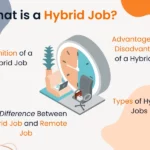
More people are rethinking the traditional four-year degree, exploring faster, skill-focused paths instead. Enter new-collar jobs and roles that value practical skills over diplomas. With rising tuition and student debt, many are opting for certifications, bootcamps, and hands-on learning. Companies, too, are shifting toward a skills-first mindset, opening doors to diverse talent that once got overlooked. The future of work is no longer just about college but it is about capability.
The Definition of New Collar Jobs
New-collar workers are professionals in fields that require strong technical skills but don’t necessarily call for a four-year degree. These roles focus on practical expertise, adaptability, and continuous growth.
The term, coined by former IBM CEO Ginni Rometty, describes jobs in areas like IT, cybersecurity, healthcare, cloud computing, and advanced manufacturing where knowledge work and hands-on skills meet. Think IT support specialists, data analysts, or medical technicians.
What makes these workers unique isn’t just their skill set, but how they earn it. Many take alternative routes like community colleges, bootcamps, certification programs, apprenticeships, or self-study. In today’s economy, new-collar professionals are proof that talent and capability often matter more than a diploma.
What Are the Differences Between New-Collar Workers and White-Collar Workers?
At first glance, new-collar and white-collar jobs may seem alike; both demand expertise and problem-solving and often take place in office or hybrid settings. But the differences lie in how people enter and grow within these roles.
Education Pathways
White-collar careers usually require a university degree like finance, law, or consulting, and often call for bachelor’s or even postgraduate credentials. New-collar roles, however, emphasize skills over diplomas. A coding bootcamp, IT certification, or cloud training program can open doors without a four-year degree.
Access and Inclusivity
By removing degree barriers, new-collar jobs create opportunities for a broader range of people. They empower those who may not pursue costly higher education but can excel through targeted training, helping build a more diverse and inclusive workforce.
Nature of Work
White-collar jobs often center on strategy, leadership, and organizational decision-making. New-collar roles lean on specialized technical expertise like supporting IT systems, protecting networks, or running advanced manufacturing tools. Far from “lesser,” these jobs are now indispensable to modern business.
Career Growth
White-collar paths often follow a traditional ladder into management. New-collar careers are more flexible; professionals can pivot industries, upskill through certifications, and progress without rigid academic prerequisites.
How Do We Create a Culture Centered Around Skills-First Hiring?
Recognizing the importance of new-collar workers is only the first step. The bigger challenge lies in building a workplace culture that consistently values skills over credentials. This requires rethinking recruitment, training, and the very idea of what makes a “qualified” candidate.
Redesign Job Descriptions
Most job postings default to degree requirements, even when the role doesn’t truly demand one. To shift toward a skills-first mindset, organizations need to strip out unnecessary academic prerequisites. Instead, they should focus on listing the actual competencies needed: programming languages, customer service experience, project management ability, or technical troubleshooting.
Expand Pathways into the Workforce
Companies should create partnerships with community colleges, trade schools, coding bootcamps, and apprenticeship programs. These channels provide access to diverse pools of skilled candidates who may be overlooked by traditional recruiting. By engaging with these alternative pipelines, businesses ensure that they aren’t just fishing in the same narrow pond of degree holders.
Invest in Continuous Learning
Skills have a shorter shelf life than degrees. A college diploma earned a decade ago may not guarantee relevance in today’s fast-changing industries. Companies that embrace new-collar hiring must also commit to ongoing training and professional development. Providing employees with opportunities to upskill keeps them engaged and ensures the workforce stays competitive.
Shift Hiring Culture at the Leadership Level
It is not enough to adjust job postings. Leadership teams need to actively model and champion the skills-first approach. This includes evaluating internal promotion candidates based on what they can do now and what they can learn, not solely on their academic background. Organizations that reward demonstrated ability foster loyalty and innovation.
Challenge Biases in Recruitment
Many recruiters are trained to scan for degrees as a shortcut for qualification. To counter this, hiring managers should be trained to look for alternative signals of capability—such as portfolios, project work, certifications, or even practical assessments. Skills-based interviews, case studies, and trial projects can reveal far more about a candidate’s potential than a résumé line about a degree.
Promote Success Stories
Highlighting employees who thrived through nontraditional pathways helps normalize new-collar hiring. When companies share these examples, they reinforce the idea that skill is the ultimate equalizer. It encourages other organizations to adopt similar practices and inspires job seekers who may have doubted their chances without a degree.


